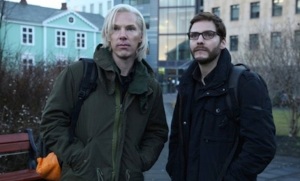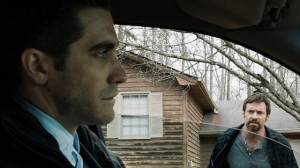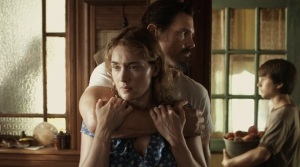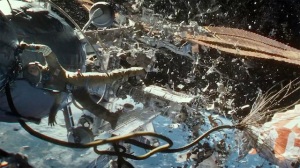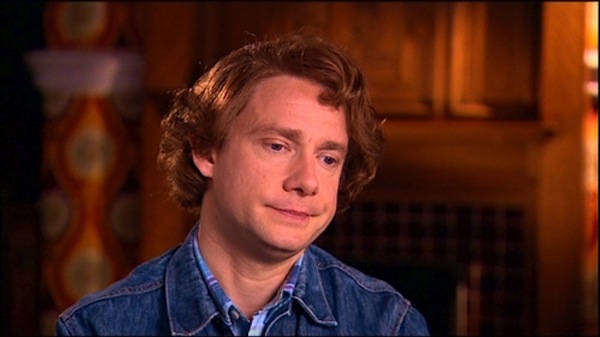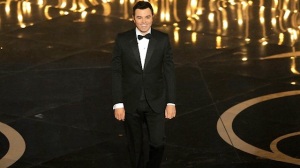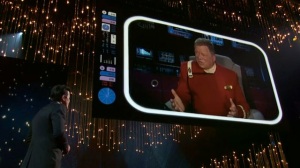You may have noticed that the site hasn’t been updated in nearly a month. There’s a good reason for that: the Toronto International Film Festival came to town, and with it, the most rewarding film experience of my life. A big thanks has to go out to WeGotThisCovered, a terrific website that gave me my first real taste of TIFF last year. I will be forever grateful that, for TIFF 2014, I got the kind of access I wouldn't have even dreamed of a year ago.
There’s nothing quite like going to TIFF as press. In the last month, I’ve seen more than 30 movies, written more than 15 full reviews and nearly 30 capsules, and transcribed many hours of raw, low-quality iPhone recordings. I’ve met, interviewed, shared elevators with, and embarrassed myself in front of actors and directors who used to only be names and faces on my computer. Better yet, I had the immense pleasure of meeting some of the film and culture writers who have had the biggest impact on me, including Scott Tobias, Noel Murray, Amy Nicholson, and Sam Adams (I’m pretty sure I saw Linda Holmes and Alyssa Rosenberg at one point, but was too cowardly to try and say hi).
Anyway, out of the last few weeks of pure joy came a number of things: unfamiliarity with REM sleep, a blossoming caffeine addiction, a new appreciation for Second Cup Wi-Fi, and a heck of a lot of writing. As one final adieu to TIFF14, here’s a collection of links masquerading as a countdown of the 31 films I saw, roughly ordered in terms of personal preference. It’s my sincere hope this become an annual tradition, because -exhausted as I am right now-, all I can think about at the moment is how excited I am for TIFF 2015.
Now let's start listing some movies!
31. The Humbling
Country: United States
Director: Barry Levinson
Alternate Title: Scent of an Asshole
This is one I’ve only grown to dislike more the further out I get from it. In an acting landscape where women over 40 are rarely shown to exist, excuse me if the last thing I’m interested in is another film about an older white guy, by older white guys, for older white guys. It’s an indulgent, and unnecessary Actor Rehab project: Pacino’s never been bad, just lazy, or miscast. He’s a good actor, so trying to build a whole film around that not being true adds a false self-reflexivity to a film that’s false and hallow all the way through. Just how misguided and obnoxious does your movie have to be to make Greta Gerwig unwatchable? The Humbling seems to have found the answer.
30. Tokyo Tribe
Country: Japan
Director: Shion Sono
Alternate Title: Escape from Tokyo
I can’t wait for this to get released, honest to God. More specifically, I can’t wait for a wider audience to see this, so that I can start reading defences of the film’s incredibly off-putting gender politics. Being able to specify where you draw the line with objectionable content is immensely important to cultural criticism, and right now, I’m in the minority for thinking Tokyo Tribe’s light-hearted genre pastiche is almost completely ruined by a reliance on distasteful misogyny. I could be in the wrong, and am excited to find out. Once other people chip in on how they compartmentalize some of the awfulness that spoiled Tokyo Tribe for me, maybe it'll become a retroactive festival highlight.
29. Hector and the Search for Happiness
Country: United Kingdom
Director: Peter Chelsom
Alternate Title: Eat, Pray, Skype
Barf. Cynicism is an ugly quality, but Lord if Hector and the Search for Happiness doesn’t leave you feeling like you need to throttle a puppy just to balance out its cloying take on self-actualization. So many fine actors, so little actual insight into what it means to be a happy, healthy human being.
28. Kill Me Three Times
Country: Australia
Director: Kriv Stenders
Alternate Title: Smokin’ Deuces
It’s back-to-back Pegg-ings! Which is a shame, because in both cases, he’s among the better things about the film. Anywho, if you’re looking for a dishwater dull knockoff of a Tarantino knockoff, this is still probably among the lesser game in town. Australia sure looks nice though, and it’s the minor entry in TIFF’s Sullivan Stapleton rebranding movement that has a more interesting entry later in this list.
27. Cut Bank
Country: United States
Director: Matt Shakman
Alternate Title: Dirt Simple
It’s back-to-back Hemsworths! Much as I enjoy seeing Michael Stuhlbarg play a character that’s essentially a psychotic Bubbles fromTrailer Park Boys, Cut Bank shares Kill Me Three Times’ rookie insecurity, loading up on violence and blood instead of characters and intrigue. A forgettable Fargo imitation is one thing. A forgettable Fargoimitation from a director who worked on the excellent Fargo TV series is just really baffling.
26. Men, Women & Children
Country: United States
Director: Jason Reitman
Alternate Title: It Came from the Internet!!!
Fool me once, Reitman… Well, I still like to tell myself I wasn’t fooled when I gave a positive review of Labor Day at last year’s TIFF, the consensus for which took a while to shake out, what with all the hysterical laughter it seemed to inspire among critics. Turns out, I’m still on the more positive end with Reitman’s latest, though that’s damning with faint praise. I really do think it’s got a better handle on Internet woes than most films attempting to explore the same, but Men, Women & Children overreaches by a mile, and ends up with little to show for its efforts.
25. The Cobbler
Country: United States
Director: Thomas McCarthy
Alternate Title: The Amazing Spider-Mensch
I’m amazed I’m coming in on the high-end for reviews on this. I mean, I thought someone would buy into the dopey magical realismThe Cobbler masks its troubling clichés and stereotypes with. Honestly, it’s those insane last 10 minutes that probably bumped it up a star in my estimation. I swear, I will go see a sequel if someone does follow up on the utterly insane ending of this film. It’s my sincere hope that the story behind The Cobbler be told one day, because no logic or reason can explain such a spectacular(ly entertaining) failure.
24. Still Alice
Country: United States
Director: Richard Glatzer & Wash Westmoreland
Alternate Title: The Most Depressing 30 Rock Reunion Imaginable
Gah, cynicism strikes again! Honestly, I think it sucks that it’s near-impossible to make a star-cast film (including Alec Baldwin and Kristen Stewart) about mental illness. Inevitably, discussion always comes back to portrayal of symptoms, and sure enough, Julianne Moore: National Treasure, does a great job of playing a driven mother diagnosed with early onset Alzheimer’s. Moore is a strong anchor for a movie that is an Issue Film through and through. There’s a lot of grandstanding, and vague outrage over how Alzheimer’s gets ignored, but the actual movie that is Still Alice explores mental illness on the most surface level of terms.
23. Maps to the Stars
Country: Canada/United States
Director: David Cronenberg
Alternate Title: L.A., L.A., it’s a Hellhole Town!
More Moore! Credit where credit is due: nobody whiffs quite so memorably as David Cronenberg. The guy at least has the sort of messed up consistency to his visions that makes even his failures feel like a wholly realized work. This is maybe where my cynicism swings in the other way, such that the truly horrible world and people of Maps to the Stars didn’t so much disturb me, as leave me mildly entertained at their descent into madness.
22. Cut Snake
Country: Australia
Director: Tony Ayres
Alternate Title: Prisoners of Love
Sullivan Stapleton image reinvention: part II. He’s the best thing aboutCut Snake, which is a totally generic crime story with one good trick up its sleeve. It bungles said trick, but better to fail in delivering on a good idea than to have none at all.
21. Cake
Country: United States
Director: Daniel Barnz
Alternate Title: The One Where Rachel Suffers from Chronic, Debilitating Pain
I’m in Cake’s corner maybe a little more than it deserves, simply because there's at least a bit of novelty to seeing a woman play the kind of bitter asshole any famous dude with a hack script can do between cash-in jobs (see: The Humbling). It’s not terribly well made or written, and dives into Indie Character Drama clichés like nobody’s business, but there’s a really fine performance from Jennifer Aniston that keeps Cake watchable throughout.
20. The Theory of Everything
Country: United Kingdom
Director: James Marsh
Alternate Title: If Redmayne's a-Hawkin', Oscar Nod's a Lock-in
I really like the lead performances in The Theory of Everything, and also appreciated a few of the directorial touches Marsh puts on an otherwise bog-standard entry in Prestige Biopicdom. The story of Stephen Hawking’s marriage to Jane Wilde does have a few unique turns to it by the end, but like a lot of biopics, it focuses too much on dramatizing the struggle of its subject instead of showing us what they accomplished.
19. Good Kill
Country: United States
Director: Andrew Niccol
Alternate Title: Death Jockey
The most immediately, and alarmingly political picture I saw at TIFF,Good Kill will hopefully get people to involve themselves in learning about drone warfare. As the subject for a film, it’s too loaded an issue to lend itself to a sustainable narrative. A bit like The Fifth Estate last year, the best you can hope for is that Good Kill works better as an introduction to a Serious Issue, than it does as an education tool, or an entertaining movie.
18. 99 Homes
Country: United States
Director: Ramin Bahrani
Alternate Title: Take Shelters
Confession: I’ve never seen a Ramin Bahrani film. I will, now that I’ve seen 99 Homes, which starts strong, but can’t keep up its bracingly specific look at the housing crisis for long. Michael Shannon, as he does, brings electric menace to his big shot realtor, but I’m not as convinced as others that Andrew Garfield is back to the levels of prowess he showed in The Social Network. It’s a shame the painful granularity of Bahrani’s look at housing repossession eventually gives way to something far more melodramatic (the finale is, to me, a complete cockup), but Shannon’s great, and underused Laura Dern is better than no Laura Dern.
17. The Equalizer
Country: United States
Director: Antoine Fuqua
Alternate Title: Geri-Action
I really did think this one would go over better with critics at TIFF than it did. Granted, an Old Man Action Movie designed for box office appeal doesn’t really jibe with the global prestige of TIFF, but The Equalizer is at least a better Old Man Action Movie than most, easily the (unironically) best since Taken. I think Fuqua builds things up nicely, injects some surface, but appreciated economic and social awareness, and once the action starts, shoots it entertainingly. It’s selling cheap R-rated popcorn thrills, but The Equalizer isn’t the first such film to benefit from standing tall in a bottom-feeding genre.
16. Wild
Country: United States
Director: Jean-Marc Vallée
Alternate Title: The Hundred-Flashback Journey
Reese will walk 500 miles, and Reese will walk 500 more, just to be the Witherspoon who walked 1,000 miles to get over a life’s worth of addiction, self-abuse, and trauma. Another very strong lead performance, another case of not enough Laura Dern. The flashback-dependent structure becomes really grating the more it’s relied upon, but there’s some good wilderness action to be found, and an inspiring story of determination that maybe didn’t need to underline how damn inspiring it is so much.
15. The Connection
Country: France
Director: Cédric Jimenez
Alternate Title: Marseille Vice
As easily entertaining as the crime genre is, it’s one that can’t ever really surprise you anymore. Setup as The French Connection, but from the French perspective, The Connection has some nice Michael Mann-esque photography (just by daylight), and a split narrative that follows both a heroine kingpin, and the magistrate out to get him. The Connection gets bogged down along with its decade-spanning investigation, but a couple interesting threads do develop. Despite being a film solely focused on these two men, it’s interesting to see how the women in their lives impact them, even when kept to the sidelines. A fantastic opening scene, and a rally at the very end helps cover-up the occasionally sluggish pace of everything in between.
14. Eden
Country: France
Director: Mia Hansen-Løve
Alternate Title: 24-Year Party People
Boy, talk about a horrible festival capper: the story of a young guy who forsakes his education in the name of following a fiscally irresponsible dream, slowly driving away all those closest to him as living on the cusp of success for two decades eventually wears him down. Eden is about a French DJ, not a pop culture writer, but needless to say, the idea of seeing a “follow your dreams” movie end more realistically than most sure felt like splash of cold fucking water. Seeing as I haven’t seen any of Mia Hansen-Løve’s other work, and can’t tell House music from Electronica from Garage, it took me awhile to warm up to this one. I suspect that, upon rewatching, I’ll enjoy the first half of Eden a second time as much as I enjoyed the second half the first time. Can’t wait to get my hands on the soundtrack, though.
13. The Lesson
Country: Bulgaria/Greece
Director: Kristina Grozeva and Petar Valchanov
Alternate Title: Fall Breakers
I was initially thrown by the questionably plausible means by whichThe Lesson wraps up its story of a schoolteacher facing an economic crisis, but upon further reflection, it’s pretty perfect. The titular lessons being taught in the classroom all find reflection in the real world, and while this makes the film feel less revealing about real financial desperation, it gives the story a fable-like rhyme scheme that makesThe Lesson both compelling and lyrical.
12. Coming Home
Country: China
Director: Zhang Yimou
Alternate Title: Still Yu
Feels like an age ago that I was watching this, as it was among the first TIFF films I caught at festival prescreening. I liked it a fair bit at the time, and look forward to having the full review released so that I can elaborate on why.
11. The Imitation Game
Country: United Kingdom
Director: Morten Tyldum
Alternate Title: World War 2.0
I had a strange realization midway through this Alan Turing biopic: I was having a lot of fun. Unlike The Theory of Everything, Imitation Game is neither too stuffy, nor slavish to genre conventions. Cumberbatch’s turn as Turing will, of course, get the most attention, but I really appreciated the way Tyldum and Graham Moore chose specific periods in the man’s life. What emerges is, to my mind, a surprisingly complex portrait of Turing’s legacy: he helped bring an end to one period of war, but his work laid the foundations for a whole new class of warfare.
10. The Last 5 Years
Country: United States
Director: Richard LaGravenese
Alternate Title: Movin’ On (Cathy’s Song)
The Last 5 Years is not what one would call a substantial film, but, good God, is a little fluff welcome every now and then, especially when a lot of TIFF’s best stuff was thoroughly depressing. That said, what I appreciated most about The Last 5 Years was how it didn’t feel beholden to the universal positivity the musical genre is often meant to inspire. Hope to see it again, now that I’ve sorted out the not-all-that-complicated-once-you-realize-how-it-works chronology.
9. Foxcatcher
Country: United States
Director: Bennett Miller
Alternate Title: Threat Level Midnight! Part Du
This is going to demand a rewatch before Oscar season, seeing as it’s currently the closest thing to an American frontrunner. I settled on the script’s depiction and Steve Carrel’s portrayal of John Du Pont as being the thing holding me back from loving Foxcatcher the way others have (though it seems I’m not alone for feeling a little cold towards it), but I have a feeling there’s more to it than that. I’m hoping another viewing will inspire the sort of “a-ha” moment where everything clicks that I thought was missing the first time around, but I suspect I’ll still enjoy the other two performances, and Miller’s direction just as much upon rewatch.
8.’71
Country: United Kingdom
Director: Yann Demange
Alternate Title: The Raid: Belfast
I openly acknowledge in my review that the above alternate title doesn’t really apply to ’71, but God forbid consistency prevent me from using the same dumb joke twice. My complete remove from the specific period of sectarian conflict ’71 documents allowed its larger message about war’s chaos to hit home with me. But I hope to read closer analyses of how’71 portrays The Troubles once more politically conscious minds have taken a look at it. As a film, though, it’s a unique blend of action, history, and fable that’s got a (simplistic) message I can truck with.
7. Nightcrawler
Country: United States
Director: Dan Gilroy
Alternate Title: TMZodiac
Another one where a healthy dose of cynicism will let you enjoy the neither optimistic, nor subtle views writer-director Dan Gilroy has of news media. It’s actually the film’s weakest element, as Nightcrawler’s really more a nightmarish take on the American Dream, with another great, strung-out performance from Jake Gyllenhaal that makes protagonist Lou Bloom as captivating as he is repulsive. Still wish I could see what Michael Mann would have done with this material, but Gilroy is starting his directing career off on a very solid win. Still can’t forgive him for The Bourne Legacy, though.
6. What We Do in the Shadows
Country: New Zealand
Director: Taika Waititi and Jemaine Celment
Alternate Title: Bat Flight of the Conchords
A mockumentary about vampires living in New Zealand. It’s painfully funny, and also shockingly proficient technically. No point in saying anything else, other than that you should go see it!
5. Phoenix
Country: Germany
Director: Christian Petzold
Alternate Title: The Second Woman
Like The Immigrant before it, I went into Phoenix with expectations set sky-high for an ending that was, apparently, going to blow me away. And again, like The Immigrant, when that final scene came along, there was no question that this was what people were referring to. That Phoenix doesn’t go for another 20-30 minutes after it’s delivered its haymaker shows wise restraint on the part of Petzold. Audiences remember devastation a lot more clearly than they do satisfaction.
4. Force Majeure
Country: Sweden
Director: Ruben Östlund
Alternate Title: At the Mountains of Dadness
One of my favourite running themes at TIFF was how the funniest films were often ones that didn’t have to sacrifice visual and emotional complexity for their laughs. Force Majeure is the most outright comic of my top 5, but it still manages to realistically portray what happens when one member of a nuclear family doesn’t live up to their unspoken responsibilities. Even if it weren’t so incisive and painfully funny, Östlund’s shooting of the French alps would make this worth the price of admission.
3. Leviathan
Country: Russia
Director: Andrey Zvyagintsev
Alternate Title: Take This Job and Shove Him
Among the many reasons to hate star-ratings is that they ask you to condense your temporary feelings on a film into a in-the-moment number. They give preference to films that immediately bowl you over instead of the ones that grow on you, which is often the real indicator of a classic. Anyway, I hedged my bets a tad with the star rating on this one, but in retrospect, it’s hard to recall what my issues were when my memories of Leviathan paint a sweeping portrait of corruption, community and family in modern Russia.
2. The Duke of Burgundy
Country: United Kingdom
Director: Peter Strickland
Alternate Title: Sapph Word
The Duke of Burgundy is an emotional rollercoaster in the truest sense, as it’s roughly split across three different temperaments: sexy, funny, and sad. It never fully separates the three, but the emotional layering of The Duke of Burgundy only gets more textured as it shifts its presentation of the film’s central relationship. Softcore eroticism gives way to parody, gives way to sharp couples comedy, gives way to heartbreak. The surrealism and formal experimentation of The Duke of Burgundy might be off-putting to many, but it’s all part of a game where dress up and roleplay are used to guard very fragile, relatable human beings.
1. Two Days, One Night
Country: Belgium/Italy/France
Director: Luc and Jean-Pierre Dardenne
Alternate Title: The Best Thing I Saw at TIFF
Every film is as personal to the viewer as it is the filmmaker, so the reason I’ve been going gaga over Two Days, One Night is because it seems like it was made specifically for me. Many are focusing on what the Dardennes are trying to say socially with the film, but to me, Two Days, One Night is a standout for having the most realistic portrayal of depression I’ve ever seen on film. In a month where I’ve seen waaaaay too many Hollywood takes on mental illness, which overdramatize symptoms and offer cheap, comforting solutions, I was incredibly moved by how Cotillard and the Dardennes created a heroine like Sandra, who embodies all the ugliest elements of mental illness, but thanks to the help of those around her –sometimes through extraordinary acts of kindness, and sometimes through simple every day ones- fights her disease honestly. There's are no marquee messages about mental illness in Two Days, One Night, or uplifting montages of life improving by eliding over the hard work it takes to earn happiness. It’s just 60 hours in the life of one incredible woman as she faces down the fear that comes with having hope, and wanting something out of life.






